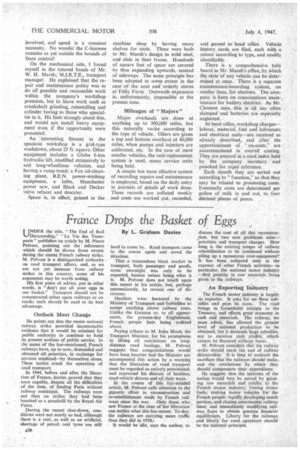France
Page 32

If you've noticed an error in this article please click here to report it so we can fix it.
Drops the Basket of Eggs By L. Graham Davies UNDER the title, "The End of Rail Dictatorship-," " La Vie des Transports" publishes an article by M. Pierre Prevost, pointing out the inferences which should be drawn from events during the recent French railway strike. M. Prevost is a distinguished authority on road transport affairs, and, as we are not yet immune from railway strikes in this country, some of his arguments may be worth noting.
His first piece of advice, put in other words, is "don't put all your eggs in one basket." Transport should not be concentrated either upon railways or on roads; each should be used to its best advantage.
Outlook Must Change
He points out that the recent national railway strike provided incontestable evidence that it would be criminal for public authority to continue to hold its present notions of public service. In the name of the last-mentioned, French railways have, up to now, demanded and obtained all priorities, in exchange for services rendered—by themselves alone. These tactics crush the operation of road transport.
In 1944, before and after the liberation of France, lorries proved that they were capable, despite all the difficulties of the time, of feeding Paris without railway assistance. The railways were not then on strike; they had been bombed to a standstill by the Royal Air Force.
During the recent shut-down, conditions were-not nearly so bad, although there is a real, as well as an artificial. shortage of petrol.and tyres are still hard to come by. Road transport came to the rescue again and saved the situation.
That a tremendous black market in transport, both passenger and goods, arose overnight was only to be expected, human nature being what it is. M. Prevost does not touch upon this aspect in his article, but, perhaps unconsciously, be reveals one of the reasons.
Hauliers were hectored by the Ministry of Transport and forbidden to accept anything above railway rates. Unlike the German or, to all appearances, the present-day Englishman. French people hate being ordered about.
Paying tribute to M. Jules Moch, the Transport Minister, for his promptness in lifting all restrictions on longdistance road haulage, M. Prevost suggests that congratulations. would have been heartier had the Minister not accompanied this action by a warning that the liberation of road transport must be regarded as entirely provisional. and expressed his distrust of hauliers, road-vehicle drivers and all their ways.
In the course of this fair-minded article, M. Prevost calls attention to the gigantic effort in reconstruction and re-establishment made by French railways since the war. Only those who saw France at the time of her liberation can realize what this has meant. To-day. the railways are carrying more traffic than they did in 193R.
It would be idle, says the author, to discuss the cost of all this reconstruction, but two new problems arise— priorities and transport charges. How long is the existing tempo of railway rehabilitation to be continued without piling up a monstrous over-equipment? It has been achieved only at the expense of other French activities—in particular., the national motor industry —first priority in raw materials being given to the railways.
An Exporting Industry
The French motor industry is largely an exporter. It asks for no State subsidies and pays its taxes. The road brings in formidable receipts to the Treasury, and effects great economy in cash and materials. The railway, we must admit, has allowed the present !eve( of national production to be obtained, but it demands huge subsidies, not to mention cash credits, which cannot be financed without loans.
M. Prevost considefs that the railway strike should mark the end of railway dictatorship. It is time to measure the sacrifices that the railways should make, and the restrictions by which they should compensate their expenditure.
He suggests that the interests of the nation would best be served by granting raw materials and credits to the French motor industry; freeing motor fuels; making motor vehicles for the French people; rapidly developing coach services, and closing uneconomic railway lines; and immediately modifying railway fares to obtain genuine financial equilibrium. Liberty for the railways and liberty for road operators should be the national principle.












































































